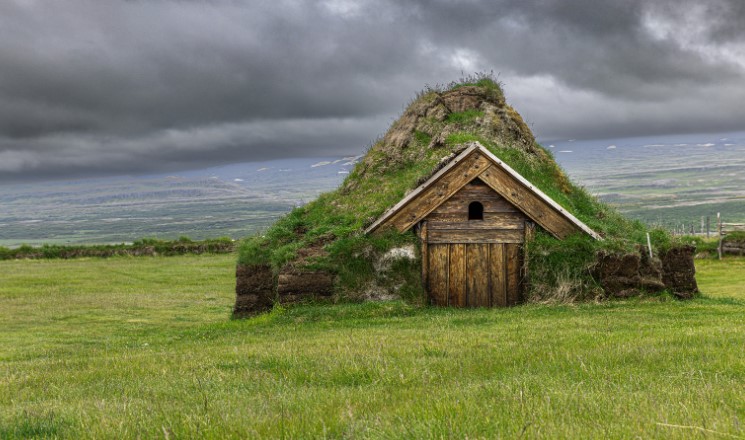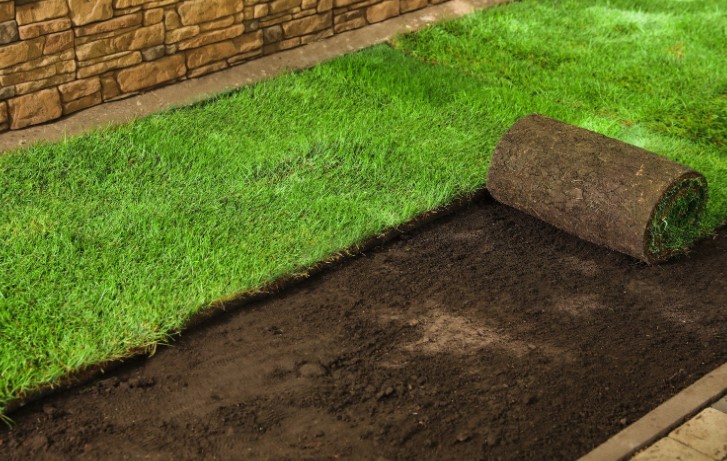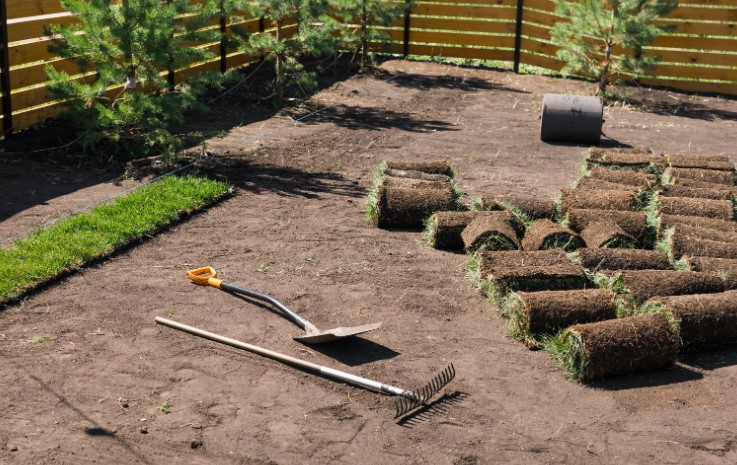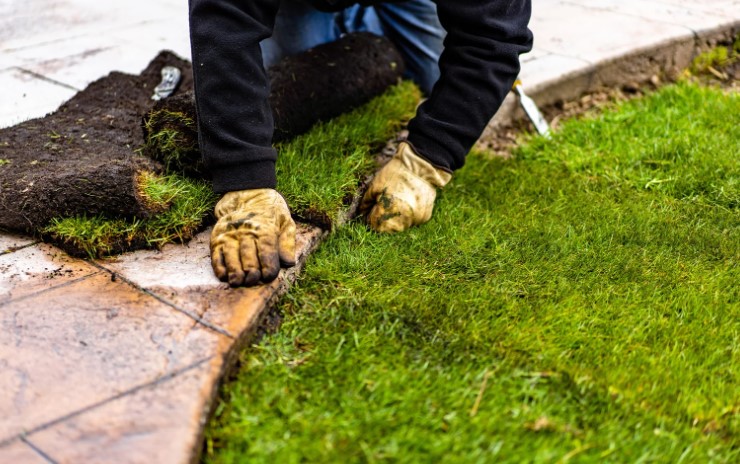- Is It Possible to Lay Turf Over Existing Grass?
- Can You Lay Topsoil Over Grass and Then Turf?
- Can I Put Topsoil Over Grass and Reseed?
- Can You Put Soil on Top of Grass to Level a Lawn?
- What’s the Best Way to Lay Turf for Lasting Results?
- Can You Lay Turf in Any Season?
- Turfing vs Reseeding: What’s Right for Your Lawn?
- Lawn Prep Checklist Before You Lay Turf or Reseed
- Conclusion: Should You Lay Turf Over Grass or Start Fresh?
- FAQs: Can You Lay Turf or Soil Over Grass?
When your lawn’s looking tired, patchy, or just beyond repair, it’s natural to look for the quickest fix. You may be wondering, can you lay turf on top of grass, or even “can I just put some topsoil over grass and reseed?”
These are common questions among UK homeowners hoping to refresh their garden without tearing everything up.
Let’s explore the truth behind these shortcuts — and how to lay turf the right way for long-term results.
Is It Possible to Lay Turf Over Existing Grass?
Technically, yes, you can lay turf over grass. But that doesn’t mean you should.
Laying new turf directly over old grass might seem like a time-saver, but it often leads to poor root growth, turf rot, and an uneven lawn.
The layer of grass underneath prevents proper bonding between the new turf and the soil, which can lead to:
- Shallow roots
- Patchy growth
- Drainage problems
- Disease or pest issues
Pro tip: For a lush, healthy lawn that lasts, removing the old grass is strongly recommended.

Can You Lay Topsoil Over Grass and Then Turf?
This is another popular shortcut, especially if you’re trying to level your garden at the same time. So, can you lay topsoil over grass and then turf? You can, but success depends on how it’s done.
How Much Topsoil Do You Need?
To smother old grass effectively, you’ll need at least 2 to 3 inches of fresh topsoil. This allows new turf roots to grow into a healthy medium without being blocked by the old lawn below.
Will This Work Long-Term?
Only in very specific cases:
- The old grass is mostly dead
- You’re covering a small area
- You’re using high-quality topsoil
However, the grass underneath may still decay, causing air pockets and uneven surfaces.
Can I Put Topsoil Over Grass and Reseed?
Yes, you can — and this method works better than turfing over grass in many cases.
How to Do It Properly
- Mow the existing grass short
- Scarify or aerate the area
- Spread 1–2 inches of topsoil
- Reseed and water regularly
This allows new seed to root in the topsoil while keeping the old grass suppressed.
Ideal for thinning lawns that need a refresh — not complete renovation.

Can You Put Soil on Top of Grass to Level a Lawn?
Yes! This is called topdressing, and it’s a common technique to smooth out dips and uneven patches.
When to Topdress?
- After aerating the lawn
- During spring or autumn
- When trying to improve drainage or seed coverage
What Soil Should You Use?
Use a sandy loam mix — it drains well and encourages healthy growth.
How to Topdress Effectively?
- Spread in thin layers (no more than 1 inch at a time)
- Use a rake or lawn leveller
- Water thoroughly after application
What’s the Best Way to Lay Turf for Lasting Results?
If you’re not cutting corners, here’s how to get it right:
Step-by-Step Turfing Guide
- Remove old grass using a turf cutter or spade
- Add 4–6 inches of quality topsoil
- Level the ground and firm it down
- Water the soil 24 hours before laying turf
- Lay turf in staggered joints, like brickwork
- Press down gently with a roller or feet
- Water daily for the first 2 weeks
Common Mistakes to Avoid
- Skipping soil preparation
- Laying turf on compacted or dry ground
- Walking on fresh turf too soon
Can You Lay Turf in Any Season?
You can, but timing matters for best results.
When Is the Best Seasons for Turfing in the UK?
The best season for turfing is typically on the following:
- Spring (March–May)
- Autumn (September–October)
These seasons offer cool temperatures and regular rainfall, which help the turf root faster.
When To Lay Turf in Summer or Winter?
- Summer: Turf may dry out quickly, needing frequent watering.
- Winter: Roots grow slowly; turf might sit dormant and become waterlogged.
🌱 Whenever you choose to lay turf, make sure the soil is not frozen, waterlogged, or bone-dry.

Turfing vs Reseeding: What’s Right for Your Lawn?
| Factor | Turfing | Reseeding |
| Speed of results | Instant green lawn | 4–8 weeks |
| Cost | Higher | Lower |
| Labour | Moderate | Low |
| Best for | Dead or bare lawns | Thinning or patchy areas |
| Long-term success | High if laid properly | High with maintenance |
Lawn Prep Checklist Before You Lay Turf or Reseed
Here’s a quick list to keep you on track:
- Old grass removed or smothered
- Ground levelled and topsoil added
- Chosen the right time of year
- Water source available for aftercare
- Tools ready: rake, roller, hosepipe
Conclusion: Should You Lay Turf Over Grass or Start Fresh?
So, can you lay turf on top of grass? Technically yes — but it’s not the right approach if you want healthy, lasting results.
The best practice is to:
- Remove the old lawn
- Prep your soil properly
- Lay turf in ideal weather conditions
Or, if your lawn just needs a refresh, putting topsoil over grass and reseeding can be a great alternative.
Whichever method you choose, a little effort in preparation goes a long way toward creating the lush, green lawn you’ll love.
FAQs: Can You Lay Turf or Soil Over Grass?
1. Can you lay turf on top of grass and still get good results?
It’s possible, but rarely successful long-term. Removing the old grass gives the best outcome.
2. Can you lay turf over grass with soil added on top?
Yes — but only if you add 2–3 inches of topsoil and the grass underneath is dead or dying.
3. Can I put topsoil over grass and reseed instead of turfing?
Yes! It’s a budget-friendly option that works well for lightly damaged or thinning lawns.
4. Can you put soil on top of grass to level your lawn?
Yes — this is called topdressing. It helps smooth out dips and improve soil structure.


0 Comments